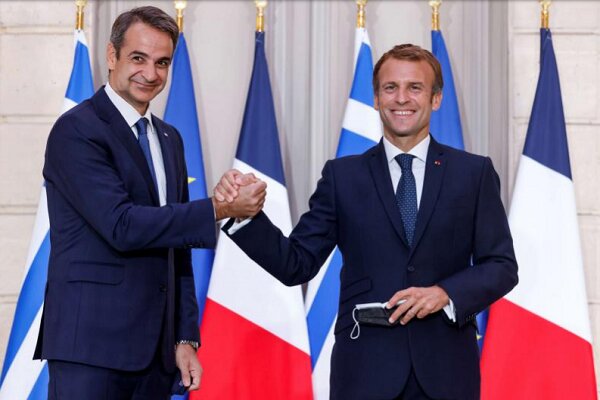Greece was very active in diplomacy and developing relations with other countries, despite economic difficulties. In the last year, it has increased its defense and security cooperation with the United States, France, and the Zionist regime, with the full support of the European Union. Athens has expanded its relations with Saudi Arabia, Bahrain, the UAE, Jordan, Egypt and Libya, while exhibiting power in the Mediterranean. The purchase of Greek weapons from France and the United States, the signing of a military agreement with Israel, and the holding of numerous military exercises with Arab countries in the Mediterranean are among the actions taken by Greece that have raised concerns and protests in Turkey.
Greece also recently signed a defense agreement with France, which was strongly opposed by Turkey. The strategic agreement on military and defense cooperation between Greece and France includes the ordering of three vessels. The purchase of these ships should be completed by the end of this year, worth 3.5 billion dollars, and delivered by 2025. In September, the Greek Air Force officially announced that it wanted to purchase six more Rafael fighter jets from France and increase its total order to about 30 fighter jets. The decision was immediately approved by parliament.
Athens is also in talks to buy four new frigates. Greece has allocated 11.5 billion euros (14 billion dollars) to modernize its armed forces over the next five years. Delivery of 18 Rafael aircrafts is scheduled to be completed within two years. Jets and the purchase of air-to-air missiles are estimated to cost 2.3 billion euros. Paris also plans to equip the Greek navy with warships.
The Greek-French Strategic Partnership Agreement provides for mutual military assistance in the event of an armed attack by a third country, even a NATO member, on one of the two countries. Athens in general claims that with the defense agreement signed with Paris, France will be responsible for defending Greece in the event of a possible Turkish attack. According to the Greek Prime Minister, the French intervention in the presence of the Orux Reis drilling ship in southern Crete, according to the agreement with France, stipulates that France is obliged to assist Greece in the event of a Turkish attack. Greece has been pursuing such agreements with European countries for the past 40 years so that Europe can intervene where NATO and the United Nations are reluctant to intervene. Greece has reached agreements with France, the United States, Egypt and Italy on the delimitation of maritime zones over the past two years.
Regarding Greece’s defense agreements with France and the United States, the Greek Prime Minister believes that Greece will strengthen its defense and sign agreements within the framework of international law. Greece, Cyprus and Egypt have demonstrated their adherence to international law and have signed a maritime delimitation agreement with Egypt. The Greek Foreign Minister criticized Turkey’s reaction to the Greek agreement with France and the United States, claiming that “Greece’s agreements with France and the United States are also beneficial for NATO and for the stability and security of the region. Turkey’s reactions can only be justified if it considers itself an aggressor country. These reactions are completely incomprehensible. Greek agreements and memoranda of understanding are not against any country, including Turkey. This defense agreement strengthens Europe’s defense and security, strengthens transatlantic ties and a more equitable distribution of responsibilities. “
The Turkish president and defense minister have repeatedly spoken out against Greek-French defense cooperation over the past month. Even during his recent meeting with Joe Biden and Macron on the sidelines of the G20 summit in Rome, Erdogan expressed his country’s concern about setting up a base in Greece’s Alexandroupolis (40 km from Turkey) to control the Balkans, which Macron apparently did not answer and only emphasized Greece’s request to buy the fighter from France.
The Turkish defense minister claimed in July that Greece had entered into an arms race, that they were buying weapons and equipment, but that it was not possible to change the balance of power with a few second-hand jets. According to Ankara, any country can sign an agreement with any other country. We do not claim that all these agreements are against us. The important thing is to be able to defend our continental shelf. We have shown and will continue to show our ability both on the ground and at the diplomatic table against those who try to trample on our rights.
As tensions between Turkey and Greece continue in the eastern Mediterranean, Greece, along with the United States, Britain, France, Italy, Israel, Egypt and Greek Cyprus, held a joint exercise called Nemesis with fighter jets and warships. According to Turkey, the formation of new alliances within NATO, the purchase of military weapons and the support of NATO member states will damage the “spirit of NATO solidarity” and bilateral relations. Provocative actions and rhetoric that increase tensions will not work and should be avoided. The NATO Alliance of which we (Turkey) are a member is the strongest defense organization today and in history; So everyone should know that pursuing other coalitions as long as they are inside the organization will damage NATO and bilateral relations and undermine trust.
Although France has condemned unilateral action in the eastern Mediterranean and sent frigates to the region, it continues to believe that NATO is not being open enough with Ankara. Within NATO, all these issues must be clarified with Turkey, and everything must be done so that Turkey does not turn its back on Europe and turn to religious extremism or negative geopolitical options.










0 Comments